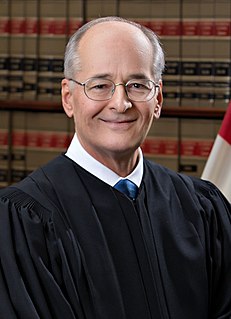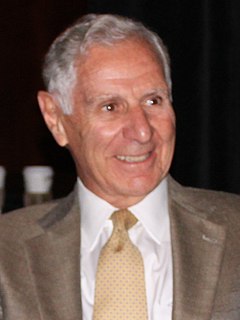A Quote by Wendy Long
A judge is supposed to have empathy for no one but simply to follow the law.
Related Quotes
The law has been perverted, and the powers of the state have become perverted along with it. The law has not only been turned from its proper function, but made to follow an entirely contrary purpose. The law has become a tool for every kind of greed. Instead of preventing crime, the law itself is guilty of the abuses it is supposed to punish. If this is true, it is a serious matter, and moral duty requires me to call the attention of my fellow-citizens to it.
People must be confident that a judge's decisions are determined by the law and only the law. He must be faithful to the Constitution and statutes passed by Congress. Fidelity to the Constitution and the law has been the cornerstone of my life and the hallmark of the kind of judge I have tried to be.
In the country field, we’re brought up in spiritual homes, we’re taught to “judge not lest you be judged,” and it’s always been a mystery to me how people jump all over things just to criticize, condemn and judge other people when that is so un-Christian – and they claim to be good Christians! We’re supposed to love one another. We’re supposed to accept and love one another. Whether we do or not, that’s a different story. But that’s what we’re supposed to do.
Courts are the mere instruments of the law, and can will nothing. When they are said to exercise a discretion, it is a mere legal discretion, a discretion to be exercised in discerning the course prescribed by law; and, when that is discerned, it is the duty of the Court to follow it. Judicial power is never exericised for the purpose of giving effect to the will of the Judge; always for the purpose of giving effect to the will of the Legislature; or, in other words, to the will of the law.
I think whether you are a judge on my court or whether you are a judge on a court of appeals or any court, and lawyers too - and if you're interested in law yourself, you'll be in the same situation - you have a text that isn't clear. If the text is clear, you follow the text. If the text isn't clear, you have to work out what it means. And that requires context.
There has been no clearer principle of English or American constitutional law than that, in criminal cases, it is not only the power and duty of juries to judge what are the facts, what is the law, and what is the moral intent of the accused; but that it is also their power, and their primary and paramount duty, to judge the justice of the law, and to hold all laws invalid, that are, in their opinion, unjust or oppressive, and find all persons guiltless in violating, or resisting the execution of, such laws.
The Supreme Court, or any court, when they make a decision, if that's a published
decision, it becomes virtually like a statute. Everybody is suppose to follow that law. Whether I decide to allow a law to become a law without my signature is simply
in effect expressing a view that while I don't particularly care for this, the Legislature passed it, it was an overwhelming.
vote, or maybe there were other reasons. But
my decision not to sign doesn't have to be followed by
everybody from that point on



































